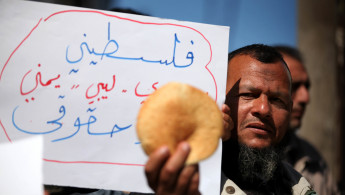Gaza's workers face an 'unbearable situation' warns Palestinian Trade Union Federation
For years, workers in Gaza have been struggling to keep themselves and their families afloat in midst of low wages and increasing unemployment.
On May 1st, as workers around the world celebrated International Labour Day and Eid al-Fitr, like many Palestinian workers in the besieged Gaza Strip, Mohammed Shaalan, a cleaner, says that he was unable to provide anything for his children for the celebrations.
"I was unable to buy new clothes for my children or even sweets for such an occasion," the 45-year-old father of six told The New Arab.
"I work 12 hours a day as a cleaner in a factory, and I only receive about $US 7 a day," the cleaner said. "Do you think that I will be able to provide the money to buy clothes for this number of children?"
According to Shaalan, his family is heavily reliant on aid provided by the United Nations Relief and Works Agency for Palestine Refugees (UNRWA).
More than 80% of the people of the Gaza Strip depend on humanitarian aid, according to the United Nations, as a result of the 15-year-old Israeli blockade.
For his part, Shaalan called on the Hamas-run local authorities in Gaza to increase the minimum wage to $US 600 to tackle the high cost of living in the coastal enclave and keep families from plunging deeper into poverty.
"The unemployment rate among workers in Gaza has reached nearly 55 per cent, while about 80 per cent of them suffer from extreme poverty," the head of the Palestine Trade Union Federation in Gaza, Sami Al-Amsi, told The New Arab.
"We warn of the danger of the unbearable situation in Gaza, especially in light of the occupation's procrastination and failure to adhere to agreements made with [Palestinians] factions regarding improving the conditions of [Gaza's] citizens," Amsi said.
"Gaza is living under an Israeli siege for 16 years; a crime not witnessed in all of history," he added.
For his part, the head of the Palestinian People's Committee to Confront the Siege on Gaza, Jamal Al-Khudari, told The New Arab, that the economic conditions in Gaza "are getting more difficult and exacerbated with the continuation of the siege and the repercussions of the COVID-19 pandemic."
Khudari criticized the absence of realistic and practical solutions, as well as the international community's disregard for the catastrophic humanitarian situation experienced by two million Palestinians in the Gaza Strip.
In-depth - ‘#Gazans turn to Bitcoin to escape financial blockade‘ writes Fadi O. Al-Naji https://t.co/KYRBoFg0ZK
— The New Arab (@The_NewArab) March 24, 2019
He called on the World Trade Union, Arab and Islamic countries to contribute to the relief of workers in Palestine in general and the besieged Gaza Strip in particular.
Israel has imposed a tight siege on the Gaza Strip since mid-2007 after the Islamic Hamas movement took control of the Strip from forces loyal to the Palestinian Authority. In addition to the siege, Israel launched four wars on Gaza since 2008, causing thousands of deaths and injuries.
The successive years of the Israeli-imposed siege propelled the unemployment rate in the Gaza Strip to become among the highest in the world, noted several reports by the World Bank.





 Follow the Middle East's top stories in English at The New Arab on Google News
Follow the Middle East's top stories in English at The New Arab on Google News


